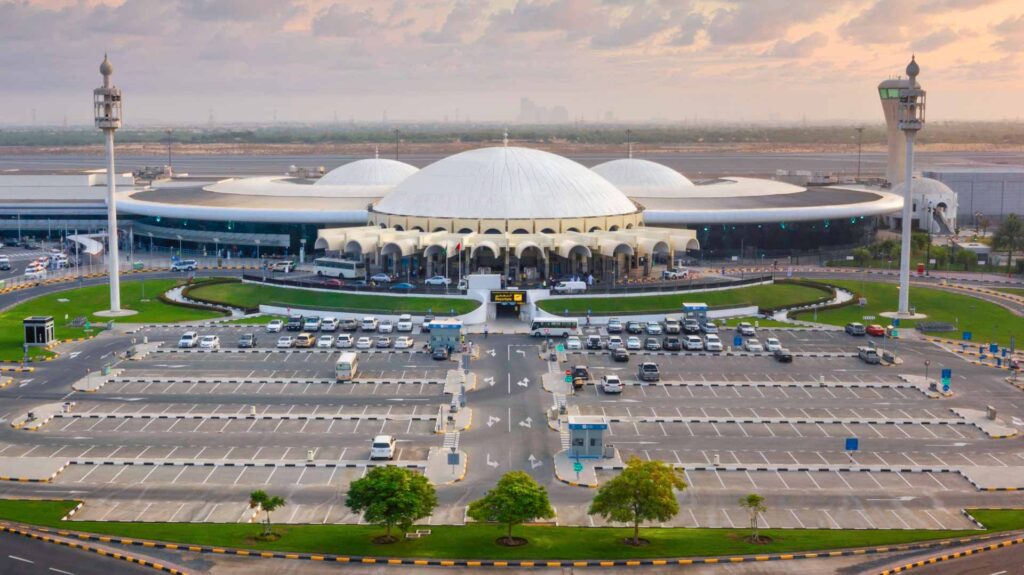Sharjah Airport sustainability initiatives have placed it at the forefront of eco-friendly aviation practices. In today’s world, where environmental responsibility is no longer optional but essential, Sharjah Airport is proving that airports can operate efficiently while minimizing their environmental impact. The airport’s initiatives not only reduce its carbon footprint but also create awareness among travelers and stakeholders about the importance of sustainability.
From energy efficiency to waste reduction, water conservation, and community engagement, Sharjah Airport has developed a comprehensive approach to sustainability. This article explores these initiatives in detail and highlights how they are transforming the airport into a model of environmental responsibility.
Commitment to Carbon Neutrality
One of the most significant achievements of Sharjah Airport is its commitment to carbon neutrality. The airport has implemented a comprehensive carbon management strategy designed to minimize greenhouse gas emissions across all operations. This involves careful monitoring of energy usage, optimizing processes, and investing in sustainable technologies.

Energy efficiency is at the core of these efforts. The airport has introduced advanced lighting systems, motion sensors, and energy-efficient appliances to reduce electricity consumption. Solar energy integration has also played a critical role in powering airport facilities, from terminals to operational areas. By adopting renewable energy solutions, Sharjah Airport reduces reliance on fossil fuels and decreases its overall carbon emissions.
Another key aspect is stakeholder engagement. The airport actively collaborates with airlines, ground service providers, and other partners to ensure that sustainability practices extend across the entire airport ecosystem. By working together, all parties contribute to a greener, more sustainable airport environment.

Waste Management and Recycling Programs
Sharjah Airport sustainability initiatives place a strong emphasis on waste management. Reducing landfill waste and promoting recycling are top priorities. The airport has established a robust system for segregating waste, ensuring that recyclable materials are properly processed and reused wherever possible.
Public awareness campaigns encourage passengers and staff to participate actively in these efforts. Educational materials and signage guide travelers on proper disposal methods, while staff training ensures that recycling protocols are consistently followed. Additionally, the airport has partnered with environmental agencies to optimize waste management processes and enhance recycling rates.
These initiatives help reduce the airport’s ecological footprint and set an example for other airports in the region. By focusing on proper waste segregation, responsible disposal, and recycling, Sharjah Airport demonstrates that large-scale facilities can operate sustainably without compromising efficiency.
Water Conservation Efforts
Water conservation is another critical area of Sharjah Airport sustainability initiatives. Operating in a desert environment requires careful management of water resources. To address this, the airport has introduced innovative measures that significantly reduce water consumption.
One of the key measures is the use of treated wastewater for landscaping and irrigation. The airport’s wastewater treatment systems can process large volumes of water, making it safe for reuse in maintaining green spaces. This reduces the demand for potable water and ensures that the airport maintains lush, sustainable landscapes.
Water-efficient fixtures have also been installed throughout the terminals, including low-flow faucets and toilets. These small changes collectively result in substantial water savings over time. By integrating these practices, Sharjah Airport showcases how large transportation hubs can minimize water usage without affecting passenger comfort or operational functionality.
Green Transportation Solutions
Sustainable transportation is another area where Sharjah Airport is making significant progress. Reducing emissions from vehicles and promoting eco-friendly alternatives are central to the airport’s approach.
The airport has introduced electric vehicles for ground handling operations, gradually replacing traditional diesel-powered fleets. This transition not only reduces emissions but also lowers operational costs over time. Solar-powered lighting systems have been installed across parking areas and access roads, further cutting down electricity consumption while maintaining safety and visibility.
In addition, the airport encourages public transportation usage among passengers and staff. By providing easy access to buses and other eco-friendly transport options, Sharjah Airport helps reduce the number of private vehicles on the road, thereby lowering overall emissions and traffic congestion around the airport.

Biodiversity and Green Spaces
Sharjah Airport sustainability initiatives extend beyond operations to include biodiversity and the creation of green spaces. The airport has made a concerted effort to integrate nature into its facilities, recognizing the benefits of greenery for both the environment and passenger experience.
Tree planting programs enhance air quality, provide shade, and create a visually appealing landscape. Indoor plants within terminal buildings improve air quality while offering passengers a pleasant and relaxing environment. Landscaped gardens are carefully designed to support local flora and fauna, helping maintain ecological balance even within a high-traffic airport setting.
These green spaces also serve as educational tools, allowing visitors to observe and appreciate sustainable practices firsthand. By fostering biodiversity, Sharjah Airport demonstrates that environmental stewardship can be seamlessly integrated into modern infrastructure.
Community Engagement and Education
Sharjah Airport sustainability initiatives emphasize community engagement and education as essential components of their environmental strategy. The airport believes that sustainability is a collective responsibility, requiring the involvement of staff, passengers, and the wider community.
Educational programs are regularly organized to raise awareness about environmental conservation. Workshops, seminars, and interactive activities help staff and visitors understand the importance of sustainable practices. The airport also collaborates with local schools to educate students about eco-friendly habits, creating a generation that values environmental responsibility.
Public campaigns further reinforce these messages. By promoting recycling, energy conservation, and sustainable behavior, Sharjah Airport fosters a culture of environmental awareness that extends beyond its immediate operations.
Innovation and Technology
Technology plays a pivotal role in Sharjah Airport sustainability initiatives. Innovative systems are deployed to monitor energy consumption, water usage, and waste generation in real time. These insights allow the airport to implement targeted improvements and track progress toward sustainability goals.
Automation and smart systems contribute to operational efficiency while reducing environmental impact. For example, automated lighting and climate control systems optimize energy use based on occupancy and weather conditions. Such innovations ensure that resources are used responsibly and wastage is minimized.
By embracing technology, Sharjah Airport not only enhances operational efficiency but also positions itself as a forward-thinking leader in sustainable aviation practices.

Future Sustainability Goals
Looking ahead, Sharjah Airport has ambitious goals to further strengthen its environmental initiatives. Achieving net-zero emissions remains a primary objective, with continued efforts to reduce, offset, and monitor carbon output.
The airport plans to expand the use of renewable energy, particularly solar and other sustainable sources, across its facilities. Waste diversion strategies will also be enhanced to ensure that more materials are recycled and less ends up in landfills.
Promoting sustainable tourism is another focus area. The airport aims to educate travelers about eco-friendly practices, from reducing single-use plastics to supporting green initiatives at their destinations. By encouraging responsible tourism, Sharjah Airport extends its sustainability impact far beyond the airport itself.
The Global Impact
Sharjah Airport sustainability initiatives are not just local achievements—they have global significance. By demonstrating that large airports can operate sustainably without compromising efficiency, Sharjah Airport sets a benchmark for others to follow.
Its practices inspire airports worldwide to adopt similar measures, from carbon neutrality to waste management, water conservation, and community engagement. The airport’s success proves that environmental responsibility can be integrated seamlessly into modern infrastructure, benefiting both the planet and the communities it serves.
Conclusion
Sharjah Airport sustainability initiatives highlight the airport’s role as a pioneer in eco-friendly aviation. Through comprehensive programs in energy efficiency, waste management, water conservation, green transportation, biodiversity, and community engagement, the airport has created a model for sustainability that others can emulate.
By combining innovation, technology, and a strong commitment to environmental stewardship, Sharjah Airport demonstrates that operational excellence and sustainability can go hand in hand. As travelers, staff, and communities embrace these initiatives, the airport not only reduces its environmental impact but also contributes to a greener, healthier future for everyone.
Sharjah Airport’s journey proves that when vision, planning, and action come together, sustainability is not just a goal—it becomes a reality that benefits generations to come.
Do follow UAE Stories on Instagram
Read Next – Amazing MOTN Festival 2025 Abu Dhabi: Must See Highlights














